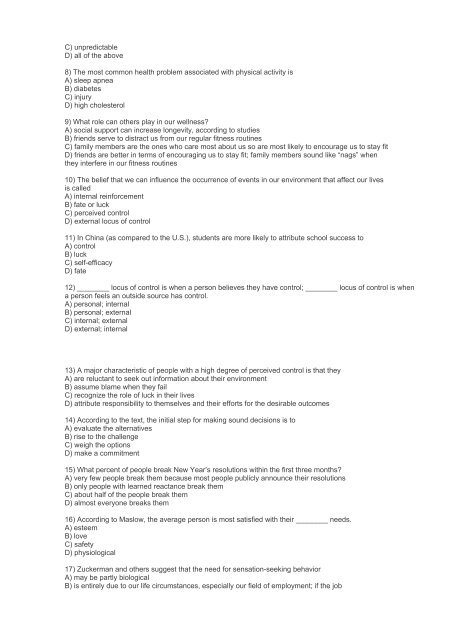GED 215 Unit 2 Exam 2 (CCU)
Create successful ePaper yourself
Turn your PDF publications into a flip-book with our unique Google optimized e-Paper software.
C) unpredictable<br />
D) all of the above<br />
8) The most common health problem associated with physical activity is<br />
A) sleep apnea<br />
B) diabetes<br />
C) injury<br />
D) high cholesterol<br />
9) What role can others play in our wellness?<br />
A) social support can increase longevity, according to studies<br />
B) friends serve to distract us from our regular fitness routines<br />
C) family members are the ones who care most about us so are most likely to encourage us to stay fit<br />
D) friends are better in terms of encouraging us to stay fit; family members sound like “nags” when<br />
they interfere in our fitness routines<br />
10) The belief that we can influence the occurrence of events in our environment that affect our lives<br />
is called<br />
A) internal reinforcement<br />
B) fate or luck<br />
C) perceived control<br />
D) external locus of control<br />
11) In China (as compared to the U.S.), students are more likely to attribute school success to<br />
A) control<br />
B) luck<br />
C) self-efficacy<br />
D) fate<br />
12) ________ locus of control is when a person believes they have control; ________ locus of control is when<br />
a person feels an outside source has control.<br />
A) personal; internal<br />
B) personal; external<br />
C) internal; external<br />
D) external; internal<br />
13) A major characteristic of people with a high degree of perceived control is that they<br />
A) are reluctant to seek out information about their environment<br />
B) assume blame when they fail<br />
C) recognize the role of luck in their lives<br />
D) attribute responsibility to themselves and their efforts for the desirable outcomes<br />
14) According to the text, the initial step for making sound decisions is to<br />
A) evaluate the alternatives<br />
B) rise to the challenge<br />
C) weigh the options<br />
D) make a commitment<br />
15) What percent of people break New Year’s resolutions within the first three months?<br />
A) very few people break them because most people publicly announce their resolutions<br />
B) only people with learned reactance break them<br />
C) about half of the people break them<br />
D) almost everyone breaks them<br />
16) According to Maslow, the average person is most satisfied with their ________ needs.<br />
A) esteem<br />
B) love<br />
C) safety<br />
D) physiological<br />
17) Zuckerman and others suggest that the need for sensation-seeking behavior<br />
A) may be partly biological<br />
B) is entirely due to our life circumstances, especially our field of employment; if the job

















